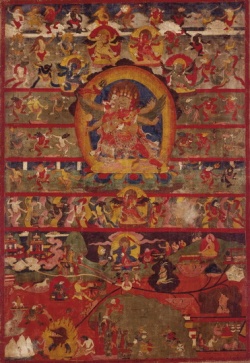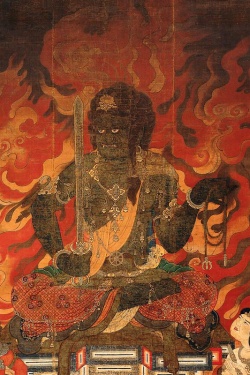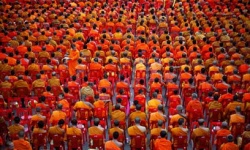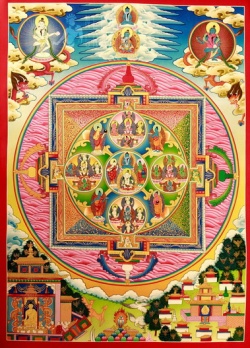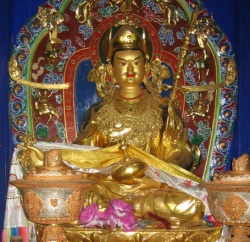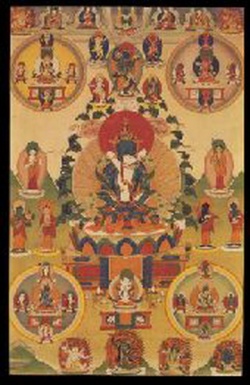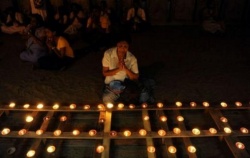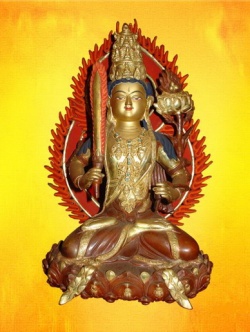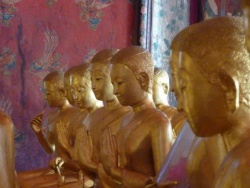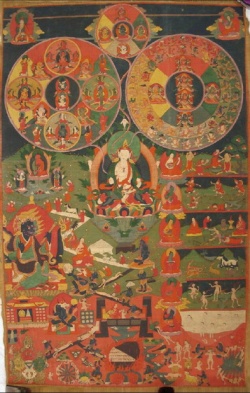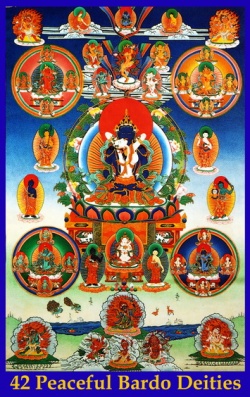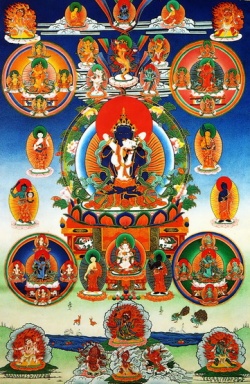The Importance at the Moment of Death
Life itself must have an ending to it. So, what does it mean, really, for the coming of the last moment of death? Does it mean an eternal ending, or the beginning of a new life, or the emergence of pain and suffering, or the starting point for happiness? During our lifetime, the natural energy of the "mind" is being captured in our physical body by the psychological hindrances of greed, hatred and ignorance, and so it can hardly be developed. However, with the coming of the last moment of death, when the last breath expires, the mind's energy, which has both clarity and strength, is suddenly released. If one can stabilize one's mind at the "goodness" of thought at this very moment, the energy of one's mind can direct and lead the dead person directly to the rebirth of the "three upper realms" - human, god and demigod. Conversely, if one's mind is attached to the "badness" of thought in the "three poisons" (greed, hatred and ignorance) at the very moment of death, the dead person will then be led to the rebirth of the "three lower realms" - hungry ghost, animal and hell.
The classic example of illustrating the importance at the moment of death is a real Chinese story on the origin of the "Prayer of Confession of Emperor Liang" It happened during the period of the Southern and Northern Dynasties, when there was an Emperor of the Liang Dynasty who had a wife, Empress Xi, on her death bed.
According to the Buddhist tradition, there will be a phenomenon of the "splitting-up of the four elements" (earth, water, fire and wind) and their dissociation at the moment of death. The order of sequence is as follows : (1) "earth element enters into water element" which is characterized by the losing of bodily functions and energy, just as in paralysis; (2) "water element enters into fire element" which is characterized by the losing of water in the body, and the mouth and noise become dried; (3) "fire element enters into wind element" which is characterized by the losing of heat in the body, and so the body becomes cold; (4) "wind element enters into the consciousness" which is characterized by the losing of the breath, and so there is no more breathing. In this process of the splitting-up and dissociation of the four elements, the sensations and feelings of the dying person will be in multiples of those of ordinary people.
An example a gentle conversation for ordinary people will be felt like thunderstorms to the dying person, and a slight touch of the body will be felt as strong and painful blows.
The story goes like this : it was in extreme hot summer while the Empress Xi was on her death bed and the female servants had been, in turns, fanning the Empress all through days and nights. At one time, one of the female servants was very tired and so carelessly dropped her fan onto the body of the Empress. However, it was like a huge stone being dropped upon her body, and so the Empress was feeling extremely painful. Immediately, a huge outrage was aroused in her heart, but since she could not speak out her mind in anger, this further added fury in her mind. This extreme outrage took her last dying breath. Her mind was totally led by this hatred and anger, which in turn linked up and dragged out all her previous "bad" deeds (karma) of both this and past lives into fruition. Immediately, she was turned into a huge snake.
As Empress Xi had also done a lot of good deeds in this and past lives (such as the building of stupas, temples and monasteries, the publications and circulations of Dharma books, the offerings to the Sangha communities, and so on), now that she had turned into a huge snake, she could still remember her immediate past life as the Empress Xi, and so she wandered around the palace and would not want to go away, hoping that her husband, the Emperor Liang, could do something to save her from this extreme difficulty.
While Emperor Liang was at the palace listening to the reports of all the ministers, they suddenly saw this huge snake and were very scared by it. Immediately, the Emperor called upon the country's spiritual master Ven. Ch'an (Zen) Master Bao Zi to the palace and asked about the event. Hence, the Ch'an Master explained clearly the whole event to the Emperor, saying that this huge snake was, in fact, his wife who had just recently passed away. The Emperor asked the Ch'an Master what could be done to save her from this situation, and so the Ch'an Master wrote a prayer of confession. Then he explained the prayer very clearly to the Empress (now as the huge snake) and asked her to confess, by reciting the prayer, all her "bad deeds" with the greatest intention and sincerity of heart.
Not long after this, after an evening when thunders and lightning filled the sky, servants in the palace had found the dead body of a huge snake (struck by lightning) at a small hill near the palace the next day. Empress Xi had finally got released from her snake body and had been reborn in the "three upper realms" With this story, this prayer was known to be the "Prayer of Confession of Emperor Liang" which is still practiced to this very day in many temples and monasteries of China.
In view of the above case study, anyone who has ripe intention, wisdom, and a good foundation of "mind training" and whose power of observation is strong, will come to the following realizations :-
(1) Even though one might have accumulated lots of "good deeds" either in this lifetime or even in many past lifetimes, one's future destiny will be determined by the very thought that one has at the moment of death;
(2) Even though one does not do any "bad deeds" and, instead, has accumulated lots of "good deeds" in this lifetime, there are still lots of "bad deeds" that one had accumulated in many past lifetimes which one does not know and just cannot estimate. These "bad deeds" will act like time-bombs, when the causes and conditions are matured and acted together, and will catch you unexpectedly;
(3) Empress Xi was able to remember her immediate past life and was helped by the Ch'an Master Ven. Bao Zi, because she had done a lot of "good deeds" in her past life, such as making offerings to the Buddhas and the Sangha communities, building many temples and monasteries, as well as in the printing and circulation of Buddhist texts and scriptures;
(4) Even though Empress Xi was helped by the Ch'an Master Ven. Bao Zi, it still depended upon whether she was willing to listen to Ven. Bao Zi's advice, and acted accordingly. In this case, she was willing to do so by sincerely confess from the deepest of her heart, so that the "seeds of the good deeds" that were embedded in her "mind-field" could now be brought out to fruition, and hence she was able to be reborn again in the "three upper realms"
(5) Even though she had the help of the Ch'an Master Bao Zi, if Empress Xi had not accumulated "good deeds" in her immediate past life, as well as in her many past lifetimes, she would not have the "seeds of the good deeds" (that were embedded in her.
"mind-field" to be brought out for fruition, and hence she would not be able to be reborn again in the "three upper realms" Thus, Empress Xi herself was the main cause for her own salvation from the lower realms, while the Ch'an Master was only the supporting condition for it;
(6) As to the accumulations of both "good" and "bad" deeds in our many past lifetimes, it is impossible for us to know exactly as to what are the quantities and the ratios of them all. Hence, at the moment of death, whether it will be the "good causes" to be fetched out first, or whether it will be the "bad causes" to be fetched out first, is really hard to reckon with. This is mainly due to the functioning of one's mind ( as to its habitual tendency of goodness or badness ) at the moment of death that is what really matters. Yet, our mind is always fluctuating all the time, and so there is really no regularities for it. This is why all Buddhists believe in the axiom of "life and death is really a big deal" and that is also the main reason why they will try to put all their efforts into Dharma practices in order to be liberated, once and for all, from life and death;
(7) If one despises the importance of this at the moment of death, and so does not think it necessary to have Dharma practices in order to correct and tune in one's mind to the "favorable circumstances", then the end result can be fatal and detrimental. Hence, Dharma practice is the ONLY WAY to change one's fate and destiny of this and future lives.
The "natural response" for all human beings, or even animals for that matter, is for self-protection. This is because of "ego-attachment" since beginningless time, that all sentient beings will arouse in themselves the "three poisons" ( of greed, hatred and ignorance ) when they got irritated. Hence, when these people are unfortunately reborn into the "three lower realms" they would suffer immense pains and sufferings. At which times, they will feel very angry of being trapped in such kind of awkward predicament; and in order to escape from this, they will try whatever means they can, even to hurt others, so as to alleviate themselves from such kind of sufferings. These kinds of actions and thoughts will accumulate more "bad causes" which in turn will bring forth more and more "bad deeds" and their results. Though there might be other "seeds of good causes" ( in their mind-fields), there is no opportunity at all for these to be brought forth, and hence the chance of escape from this difficult situation is very slim indeed. This is what we meant by the "vicious circle of bad deeds"!
Even when they are not adding new "bad causes" to the original bad ones, the chance of just trying to let the "good causes" to come forth by themselves in order to help escape from this awkward predicament is still very slim. The reason is quite simple : the situations in the "three lower realms" are very difficult, and the sentient beings are extremely painful. They are at a loss as to what could be done, and their minds simply cannot actively try to bring forth the "good causes" within their "mind-fields" In this way, the only thing that one can do is to just wait for all the "bad causes" to be realized before the "good causes" have their place to come forth. In other words, it will probably take billions of years before one can be "bailed out" from these "three lower realms".
When asked by his disciples as to the chance of becoming a human being, the Lord Buddha used his palm to pick up a heap of sand from the ground and said:"The sand in my hand represents the quantity of sentient beings to be able to become human beings, while the sand on the ground represents the quantity of sentient beings not being able to become human beings."
Some people might doubt about this statement. Please think about this : the quantity of bacteria within a bowl of rotten meat will probably be more than the whole population of a big city. Please don't forget that bacteria are also one kind of living beings. Furthermore, let's look at the quantities of the living beings that are living on the continents, which is only one-seventh of the planet earth. Then, there are the living beings in the marine world, as well as those that we cannot see but are existing in the microscopic world. What are their quantities ? And what are their proportions as compared to mankind ? This can be astronomical! Then, please think more deeply, there are other sentient beings that we cannot sense or detect -- those in the hell realm or in the hungry-ghost realm. In other words, the chance of becoming a human being is, indeed, very very slight!
The Lord Buddha had, time and again, mentioned : "Once the human body is lost, it is very difficult to recover it." There is no necessity for the Lord Buddha to deceive you, then why you still do not believe in his words? Those people who ( because of the three poisons of greed, hatred and ignorance ) commit suicide will accumulate great sins, and will immediately fall into the "three lower realms", after their deaths. It is most fortunate that one can now get this most precious human birth, after long periods of waiting and suffering. Again, with so many accumulations of "good deeds" from our many past lifetimes, we are able to have all these freedoms and endowments. If we still do not treasure it and try to make use of it in the best possible way that we can, such that we can use the strength of Dharma practice to handle the direction of our own "fate" then we only have to wait and wait for billions of years to come!
For those friends who do not believe in the Law of causes and effects (karma), do you want to bet on your own fate? While you are still happy with what you have in this life as a human being, you can easily say that there is no need for Dharma practice, thinking that "I did not do any bad things, and so what's the big deal?" But when the time comes that you are in one of the "three lower realms" when you are having immense sufferings, or that you are crawling on the ground looking for food, then there is no time for you to regret, neither have you got the time to argue with others on the issue : "Who is going to save you?" It was well said by the Lord of Compassion (Kwan-yin; Chenresig): "It is better to ask oneself, than to ask others, for help." If one does not actively engage in the Dharma practices during one's life in order to change one's own destiny and save oneself at any time, then the time comes when one is already in a critical condition, the chance of asking for others' help in order to be saved will almost be zero percent!
Endless sufferings will come by just because of one thought,
Dangers around a billion years of lives and deaths.
Now asking for others' help, but remorseful for not helping oneself before,
Painfully asking "in which life will I be freed from this cage?"
This natural law, which governs the ways that "good" and/or "bad" actions will lead to the six different life forms of (cyclic) existence, is called the Law of causes and effects (Karma). During the whole process, there is no god, buddha or creator who acts as the Judge to decide upon the destiny of each individual. From the beginning to the end, it is a matter of human conduct, and so each individual will reap what he/she has sown. The most perplexed thing of all is that there is no possibility of tracing back the records of all the "good" and "bad" deeds that one had done all through one's many past lifetimes. Hence, one will tend to believe there must be an invisible hand in control of one's own fate and destiny, and that if one can plead for mercy and salvation, then one will be saved from those tragedies. Yet, they have mistaken the fact that the most important main cause of everything is ONESELF !
As in the fable of a mouse having tied a bell onto the neck of a cat, it must be the same mouse who is brave enough to untie the bell from the cat, so it must be the same person who can save himself/herself from what he/she had done. Lord Buddha, as a good example of having saved himself through Dharma practice, knew very well that all outside forces were only supporting conditions and these could not help sentient beings to be liberated from the cyclic existence of samsara. Hence, Lord Buddha taught the Dharma teachings so that sentient beings could practice them in order to free themselves from the sufferings of samsara. In order to help his mother, Lord Buddha had to go to heaven, and then taught her the Dharma teachings, so that she could practice them and finally freed herself from the bondage of cyclic existence. For those people who are superstitious about miracles and supernatural powers, you will probably question why didn't Lord Buddha just use his "magical stick" to liberate his mother? Why did he need to go to heaven and then taught the Dharma teachings to his mother? Why so much fuss about the whole thing? The answer is very simple : not that the Lord Buddha did not want to do it in a simple way, but just because he knew that he could not do so!
One should first catch the "king" of the thieves, then all the other thieves will follow his instructions. So, the first thing that one should do is to change all those "natural responses" (of greed, hatred and ignorance), so that one can follow the instructions on those "good" thoughts and actions as taught by Lord Buddha. This kind of practice is to prepare oneself so that one's mind will be of "good" nature at the moment of death, which will help to direct oneself towards the "three upper realms" This kind of goal is of the lowest standard for Dharma practice. The other kind of important goal for Dharma practice is to liberate oneself from the bondage of cyclic existence altogether, and thus will not be bound by the natural laws. Take for instance, in the practice of Vajrayana, if one can clearly visualize oneself as the illusory yidam at the moment of death, together with a good and solid foundation in Mind Training (Lojong), then one can use the force of the mind to liberate and free oneself from this natural law that governs the six realms of cyclic existence, and can directly go to the yidam's buddha-field.
Yet, one must remember that if one lacks the foundation of Mind Training during this whole process, even though one can clearly visualize oneself as the yidam, one will fail in the escape from the bondage of samsara and eventually one will be drawn into the "three lower realms" The highest goal for Dharma practice is to attain complete enlightenment (Buddhahood), which is total freedom for oneself and the ultimate controller of one's own future and destiny. If the Dharma practitioner can achieve emptiness at the moment of death, one can be absorbed into the clear light of Dharmata and becomes the "enlightened one" (Buddha).
Usually, things are more easily said than done. Those so-called "natural responses" are innate, inborn, unconscious and are embedded within each one of us for millions of years, and it is extremely difficult to root them out completely. It must need great determination, time, perseverance, and methods, together with other supporting conditions (such as the accumulations of lots of merits), in order that one can increase the probability of becoming more certain at the moment of death. It is just natural that how much one will reap will depend on how much one had already sown. The practice of the Dharma is like a long-lasting journey, the success of which will depend on one's determined will-power and the nurture of wisdom.
Today's scientific discoveries are moving very rapidly, yet, from the Buddhist point of view, its search for the truth in human mystery is still walking on the same spot. Scientists have discovered that a large proportion of the human brain has not yet been fully utilized, and that each bodily cell, particularly each brain cell, contains various kinds of data. In this way, our human body is, in fact, a huge data bank storing billions of secret information, of which are the mysteries of evolutionary history in billions of years.
Yet, more than 2,500 years ago, the Lord Buddha had already shown us the truth that in the "mind" (the data bank) of each individual are kept all the "good and bad seeds" (data) that had been gathered ever since beginningless time. These "seeds" will follow one's "mind" wherever it goes, just like the shadow following the body, and will become the main cause in determining one's future "destiny" At the same time, these "seeds" will show themselves as the innate/inborn habitual tendencies and "natural responses" (of what we usually called as instincts in psychology) of the individual.
In order to truly and totally handle one's own future and destiny, one must have to practice the Dharma, in order to minimize the effects of those "bad seeds" (through confessions, and so on) and to accumulate lots more of those "good seeds" so that one can push one's destiny towards the circuit of the "continuous circle of good deeds" In this way, one has a much better chance in allowing the "good seeds" to be brought out, while the "bad seeds" are to be suppressed. Thus, the corrections of the so-called "natural responses" (or instincts) within oneself is the most important direction of Dharma practice.
In the long-lasting journey of Dharma practice, there are always opportunities for adverse conditions to appear. A lot of Dharma practitioners, because of not enough wisdom, could not comprehend all the circumstances and so they might end up falling off from the path. Usually, these people would have the doubt of "Why the buddhas and bodhisattvas have not blessed me, when I had already so diligently practiced the Dharma? Why did they allow me to be tortured by these adverse conditions?" or that "I have already accumulated so many good deeds, but how come that I still could not escape from all these disasters?"
There was, particularly, one case in point when a person who, after practicing the Dharma for 18 years, faced a great impact of extreme adverse conditions in his business by throwing a cup of water at the scroll of the Lord of Compassion (Kwan-yin, or Chenresig), saying :"How dare you accept my offerings everyday, you are just useless!" It is very hard to comprehend the Law of causes and effects, and so Dharma practitioners should have the following understandings in order to further develop one's own wisdom :-
Unless one has cleared all the "bad seeds"( which are piled up like mountains ) through Dharma practice, otherwise they would be brought out by other conditions. Such great masters as Nagarjuna, who had been practicing the Dharma for centuries, could confessed and cleared away 99% of his past bad deeds. If compared with them, we should know better and be shameful of ourselves for what we had done.
The "three poisons" of greed, hatred and ignorance are obscuring one's mind, and are the enemies of oneself at the moment of death. The main purpose of Dharma practice is to rid oneself of these. Thus, if one's own mind has been obscured by these poisons of habitual tendencies, then how can one expect the buddhas and bodhisattvas to protect you, when you do not even have the ability to have a genuine communion with them ?
There are certain basic ways that one can accumulate a lot of merits and wisdom for Dharma practice : to make offerings to genuine Dharma practitioners and to buddhas and bodhisattvas, to help in the propagation of the holy Dharma for the benefits of other sentient beings. All these are the basic ingredients for self-salvation and that oneself is the beneficiary of all these acts, not the buddhas and bodhisattvas! Buddhas and bodhisattvas point the ways for Dharma practice out of their own compassion for sentient beings. Not that because they want people's offerings and so they will protect them in return.
There might be gods who would protect Dharma practitioners, but they would immediately leave them if these practitioners have committed sins out of greed, hatred and ignorance. Hence, one must first be a genuine practitioner - by adhering to the disciplines and doing a lot of merits - before one would be protected by others. Furthermore, it is most essential that one should use the power of Dharma practice for the dissipation of the "bad deeds" which is the ultimate solution to one's own karmic debts.
Even when the practitioners are diligently practice the Dharma, it still needs time in order to get any favorable results. As the previous "bad causes" are on their ways of being brought forth, it will very much depend upon the "awareness" of the practitioner, as well as on his/her strength in stopping them, in order that the final results will come forth or not. We can use the analogy of the action of boiling an egg : if right at the very beginning one can be aware of it and recognize it as a "bad cause" and then try to use Dharma practice to stop it, the egg might be able to escape from its fate of being boiled. On the other hand, if one was not aware of it at the very beginning, and did not recognize it as a "bad cause" until the egg was already 70% boiled.
Then by the time one used Dharma practice to stop it from further boiling, the egg could not escape from the fact that it had already been 70% boiled. In other words, the practitioner has to be responsible for the 70% of the "bad results" due to his/her previous "bad causes" and that it can be further interpreted that through his/her efforts in Dharma practice, he/she was able to release himself/herself from the remaining 30% of the "bad results" (which he/she is supposed to reap as well if there are no efforts in Dharma practice). This can be called as "the ability to reap a lighter load of results from previously-sown heavy sins" in Buddhism, due to one's Dharma practices, such as pure and sincere confession and in doing a lot of "good deeds" and merits in order to counteract against the previously-done "bad causes".
Another important direction for Dharma practice is to use adverse conditions as a means to help trained oneself on the path, in order to secure one's firm foundation of Mind Training. Those Dharma practitioners who say high-sounding words about Buddhist teachings will soon find themselves at a loss, as to what did they gain from practicing the Dharma, when faced with real difficulties and adverse conditions. These are the cases where Dharma practice cannot be merged with one's mind, and these people are just wasting their precious human births in deceiving oneself and others!
Dharma practitioners must remember : it is extremely difficult for one to be able to maintain one's pure awareness and to hold onto the "goodness" of thought at the very moment of death, when it is extremely painful for both the body and the mind, with the four elements to be in the stage of splitting-up and dissolution. Now that we are in the comfortable conditions for both our body and our mind, it is much easier that we can keep our mind in one place; but if we are in very painful circumstances, what will become of us ? Hence, the use of adverse conditions as a means for Mind Training will help to elevate the stability of one's mind, so as to prepare oneself at the moment of death, in order to raise the probability of getting salvation. "To extract the essences from all things, and to use various circumstances as a support on the path" can be considered as the highest pith instruction of Dharma practice.
One should learn this with one's heart and mind, and then try to practice it in one's conducts, and not just to say it out as a mouthpiece of Buddhism. In Chinese, the word "crisis" is composed of two words meaning "danger" and "opportunity". Hence, during the crisis at the moment of death, it will really depend on the strength of one's own Dharma practice as to whether one can turn the "danger of being trapped in sufferings" and convert it to the "opportunity for salvation and liberation". Among all the means of Dharma practice, Mind Training is the most strong and fundamental of all!
It is so sad to see sentient beings trapped in their dream - like existence,
Fearfully met adverse conditions but nowhere to find a way out,
Lord Buddha showed the path of Mind Training to eliminate the Three Poisons,
It is the Mind that determines one's destiny at the moment of death!
There are some people who said : "If one does not know about life, how can one knows about death?" Hence, they will query as to whether the yogi style of a hermit in the Buddhist Dharma practice is too passive, pessimistic, and non-contributory, to society? For one thing, since "life and death is a big deal and it comes so suddenly" there are those genuine Dharma practitioners who are most determined, not to waste their most precious human births in the worldly dharmas, to get liberation in this lifetime by following the example of a hermit style, which is indeed the most active and optimistic way of Dharma practice and cannot be compared with those people who are mediocre in terms of their faith and conducts.
These genuine Dharma practitioners are usually harsh to themselves but extremely kind to others, and so they set an example of "cleansing the hearts and minds to set a new paradigm" for the people of this world to follow. Indeed, their great contribution to society lies in their "saving of the minds" of all worldly people. Only those false Dharma practitioners who are looking for fame, wealth, position and glory are really doing injustices to both the society and its people, and of which we should be very careful!
Can we practice the Dharma in our daily life? Can we know both life and death at the same time? Can we not follow the hermit style of Dharma practice? Will the practice of Dharma in this worldly context lower the probability of salvation and liberation from the six realms of cyclic existence? The most important part of all Dharma practices is Mind Training, which mainly teaches us to transform the so-called "natural responses" of greed, hatred and ignorance into the "altruistic enlightened mind" (bodhicitta) of a Bodhisattva.
Our daily living, which is so kaleidoscopic in terms of human relationships, events and happenings, and so forth, is in fact the origin from which all human and social problems and sufferings emerge. These are the best ingredients for our Dharma practice, as well as the best objects for our Mind Training. If one knows how to merge the Dharma practice with one's mind, and practice it in everyday life, then the only difference between Dharma practice in this worldly context and the hermit style of Dharma practice lies in their levels of difficulty.
If one can practice calm-abiding (shamatha), penetrative-insight (vipasyana), right meditation (samadhi), penetrating wisdom (prajna) and awareness in daily life xperiences, together with strict adherence to the disciplines, then Dharma practices not only can help us to know what "death" is all about (by preparing us for it), it can also help us to know what is the real meaning of "life" by solving our daily problems and adverse conditions with right meditation (samadhi) and penetrating wisdom (prajna).
The main problem lies in the fact that many Dharma practitioners cannot use Mind Training as the fundamental basis and, instead, they focus their attentions on such paraphernalia as ritual objects, statues and medicine pills for blessings, and other superstitious details, resulting in the increase (rather than the elimination) of the "three poisons" (greed, hatred and ignorance). To them, Buddhist Dharma is just another kind of knowledge, and so it does not matter whether they practice it in a hermit style or in the worldly context. Without the fundamental basis of Mind Training, their so-called Dharma practice is nothing other than the practice of the Dharma by a robot, or the reciting of mantras by a parrot, which is basically meaningless.
Then, when they come to face the cruel reality of death, it is very likely that they will face the same possibility of going into the "three lower realms" as if they had not practiced the Dharma before. Neither will they be freed of this situation even when people call them by the names of "guru", "big Dharma brother" or "Dharma practitioner". Hence, instead of trying to deceive oneself and others, to led oneself and others astray, and to waste one's own precious human birth, it is most advisable (for one's own benefits) that one should be a Dharma practitioner whose conducts are congruent from both within and without, and be a genuine one whose mind has been trained in pure intention and pure awareness.
Here, we would sincerely hope and pray that each one of you, wise Dharma friends, can make the best use of this most precious human birth, and be able to search for the real meaning of life and the real Dharma practice, and to tread on the real path of Dharma practice and work on the real methods of Mind Training, in order to finally liberate oneself from the cyclic existence of samsara.
Life - must have an end;
Moment of Death - appears as a crisis;
Mind-training - transform danger into opportunity;
Dharma practice - enriching life's meaning and experiences; "to know both life and death";
Life and death is a big deal, and it comes so suddenly -
please make the best use of this most precious human body and life; Then at the moment of death, one will not be regretful about one's whole life, and be able to lead the direction of life and death.
Hold onto the knob of destiny, to be or not to be at the very moment of death!
(1) Yidam - this is usually the practice of a Buddha or a Bodhisattva in a sadhana during the Generation stage of Vajrayana Buddhism.
